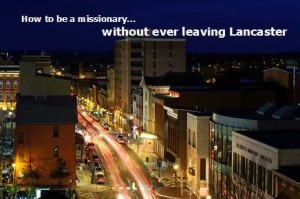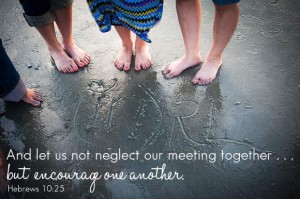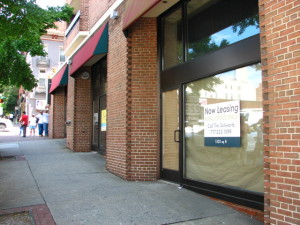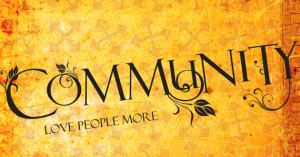 Believe it or not, here we are at the end of the summer and the end of the series entitled “How to be a missionary without ever leaving Lancaster.” Where did the summer and this series go? It totally flew by. But this summer and series helped us refocus on how we have been seeking to plant Veritas, not as a church, but as a missional community of authentic worshippers. Not as an institution, and not as a church plant, but more of a missionary community. The question that we wrestled with this summer was if you and 15 friends move to a city, how would you seek to start a faith community? Would you do it the way it has always been done, even though the times are radically changing and different? Or would you seek to plant a church as a missionary would? We have taken the approach that we are a missionary community together and seeking to plant Veritas as a missionary community.
Believe it or not, here we are at the end of the summer and the end of the series entitled “How to be a missionary without ever leaving Lancaster.” Where did the summer and this series go? It totally flew by. But this summer and series helped us refocus on how we have been seeking to plant Veritas, not as a church, but as a missional community of authentic worshippers. Not as an institution, and not as a church plant, but more of a missionary community. The question that we wrestled with this summer was if you and 15 friends move to a city, how would you seek to start a faith community? Would you do it the way it has always been done, even though the times are radically changing and different? Or would you seek to plant a church as a missionary would? We have taken the approach that we are a missionary community together and seeking to plant Veritas as a missionary community.
Over the course of the summer we have talked about the 3 parts, the 3 steps if you will, to being a missionary, and planting a missional church.
In June we covered the first stage in being a missionary/missional church that of Engaging the Culture. We talked about being a blessing, seeking the peace of the city to which he has sent you, realizing that you are sent into the world (Just as Jesus was sent), that one of the first things missionary/missional communities need to do is to look and listen to their context, and then we wrapped up the Engaging Culture month by taking a day to serve our community through making lunches and feeding people as well as sharing, talking, and praying with people.
In July we covered the second part, that of Forming Community. We talked about the idea that as followers of Jesus (and as people in general) we can’t do life alone. We absolutely need each other. We talked about the importance of being in community together. We talked about church being more like a family. And we talked about the importance of biblical hospitality in the life of a missionary/missional community.
In the month of August we covered the last of the 3 stages of being a missionary/planting a missional church. We talked about the importance that we live in such a way as individuals and as a community, where we give total allegiance to Jesus, and that Jesus is the head of the church. We talked about the gifts that Jesus has given to his church (APEST) to grow, mature, and bring the body to unity and how we as a community can develop and use those gifts. And then last week Matt Kirkley did a great job talking about the importance of meeting together and the importance of encouraging each other on the journey.
And so we come to the end of our series and I wanted to focus on a Scripture that will wrap up the series, tie it all together, and bring us back to the crux of the matter for any follower of Jesus, and any community of followers of Jesus. That Scripture being Matthew 28:16-20 and sometimes called The Great Commission.
This text is basically the last thing Jesus said to his disciples before he returned to his Heavenly Father. Think about your own life and if you were to die today, what would be the final words you would say to your love ones. To sum up your whole life, what you want your relatives and friends to know, and what legacy you want them to live out. This is what Jesus is doing with these words. He is summing up his entire life and ministry, and what he wants his disciples to be about when he returns to the Heavenly Father. The idea that we are to continue the work of Jesus after he leaves, and he is sharing what that work is. The work of being and making disciples.
Matthew 28:16-20 says this, “Then the eleven disciples went to Galilee, to the mountain where Jesus had told them to go. When they saw him, they worshiped him; but some doubted. Then Jesus came to them and said, “All authority in heaven and on earth has been given to me. Therefore go and make disciples of all nations, baptizing them in the name of the Father and of the Son and of the Holy Spirit, and teaching them to obey everything I have commanded you. And surely I am with you always, to the very end of the age.”
So the 11 disciples, minus Judas who was no longer, head to the mountain where Jesus told them to go, so that he could give them his final words, his lasting legacy. And I find verse 17 very interesting, the two different responses to the resurrection appearance of Jesus. The first response is one of worship. The appropriate response to the resurrection of Jesus, is one of worship. But the other response to his resurrection, even while he was physically standing there was one of doubt. “But some doubted”. I don’t know about you, but I feel these disciples get hammered, like “How can you doubt? Jesus has been with you for 40 days after his resurrection, you’ve seen his hands and feet, you’ve eaten with him, and yet you continue to doubt”. But to me, I resonate strongly with those disciples. That even after all that I have seen, experienced, and lived through, I still doubt. I still struggle in my faith. I still struggle seeing the resurrected Jesus and worshipping him. I still doubt. This part of the text actually brings me hope, that even in the midst of my doubt, I can still follow, serve, and live for him. That I can still be a disciple of Jesus, and that I don’t have to have it all together, and all figured out. That you can be a disciple of Jesus, still have doubts, but still follow, serve, live and seek to make disciples as well.
And so then Jesus, once the disciples have gathered begins to share with them, his final address, his legacy speech, his call for his disciples to continue his work. The first thing he says is “All authority in heaven and earth has been given to me.” He couches what he is about to say in the fact that Jesus is Lord of all. That he is truly King of Kings. That his resurrection showed the world that he had authority over life and death. And that what was about to come wasn’t just some nice information, or a suggestion. No, Jesus was saying, because I have been given authority, what I am about to tell you is of utmost importance for your life and for the church moving forward and that it wasn’t just a suggestion, or a nice thought. But a calling for each person who names the name of Jesus to live into, to follow and to put into practice.
And what is the calling that Jesus has called all followers of Jesus to, from those early disciples who literally heard his words, down through the ages and to us today in the 21st century? These words, “Therefore go and make disciples of all nations, baptizing them in the name of the Father, and of the Son, and of the Holy Spirit.” Here Jesus was giving us our mission, to be disciples and make disciples. He wasn’t saying to make converts, believers, people who agreeing with your mental propositions, or anything other than disciples. He wasn’t calling us to wait for people to come to us. To open the doors of the building and just wait. No, both of the words in this verse are active words, they are verbs. Go and Make. Not wait and hope. Not come and convert. Our job is not to wait and convert people. Our job is to go and make disciples.
And probably the better wording for “go and make disciples” is “as you are going, making disciples”. It is this idea that as you go about your work, your play, your recreation, your life, etc…It isn’t something that you need to add to your life. Like take this evangelism class, or this discipleship seminar, or this workshop (though if you want to do those things, by all means). It is the idea that as you go about your life, you are seeking to be a disciple of Jesus. To look, act, think, and be like Jesus in the world. And then living that way in front of others and helping them point their lives to Jesus, wherever they are on the journey.
You see, it is because of this Scripture that I don’t believe in evangelism. I believe in making disciples. I believe that everything you do is about making disciples. As soon as you meet someone, no matter where they are on the journey, if they know Jesus or they don’t know Jesus, you are discipling them towards something. Either towards the Kingdom of God or away from the Kingdom.
Now if our mission is to be a disciple that makes disciples, we have to ask the question, “But what is a disciple?” This word is one that we don’t normally use but in Jesus day it was prevalent. So what does it mean to be a disciple? In Jesus day rabbi’s had disciples. A disciple of a rabbi would be taught what the rabbi taught, so that the disciple could teach what the rabbi taught, and do what the rabbi did. It wasn’t just about information, though that was important. It was more about imitation (maybe the words from the apostle Paul would work well here, “Imitate me as I imitate Christ”) They would live in close proximity to the rabbi, that when they would walk around the dusty roads, they were literally covered in the dust from their rabbi. So Jesus is our rabbi. We need to walk in the footsteps of Jesus so closely, that in a way, we get covered in his dust. That we get taught what Jesus taught so that we could teach what he taught, and do what Jesus did. That is what it means to be a disciple. To live, obey, do, and be Jesus in the world.
Probably a term that would fit for our world might be learner, student, or my favorite apprentice. An apprentice, especially in relation to the technical trades is one who apprentices to a master plumber, builder, electrician and then learns what the master knows, and then seeks to do what the master does. So as an apprentice of Jesus, we learn from the Master about what life looks like in the Kingdom of God. How to live a missional, Kingdom life. And we are apprenticed in the ways of the Kingdom, in the same way Jesus apprenticed his early disciples into ways of the Kingdom. Through relationships, experience, and information. What I call REI. We become more like Jesus and help others become more like Jesus when we are in relationship with others who are further along the path than we are (as well as with Jesus), when we experience life and mission in the Kingdom, and when we include information as part of our discipleship. (Though information I don’t believe is as important as relationship and experience. Information derived because of relationship and experience is, in my understanding how Jesus taught and discipled his followers)
So let’s unpack together what it looks like on the ground to go and make disciples. Let’s talk about how you and I are being disciples who make disciples. And let’s dream together about how Veritas might be better in making disciples (especially using the REI idea) of each other and also people who God brings across our paths.
1. What would be the words that you would want to share if you knew that they would be your last? What lasting legacy/"mission" would you want to share with people? 2. If the calling that Jesus left us with is to be and make disciples how are you being a disciple and how are you making disciples? Who might God be calling you to disciple? 3. How might Veritas be better in being and making disciples especially in r elation to REI (Relationship, Experience, Information) 4. What is God saying to you and what are you going to do about it? What is God saying to us and what are we going to do about it?













